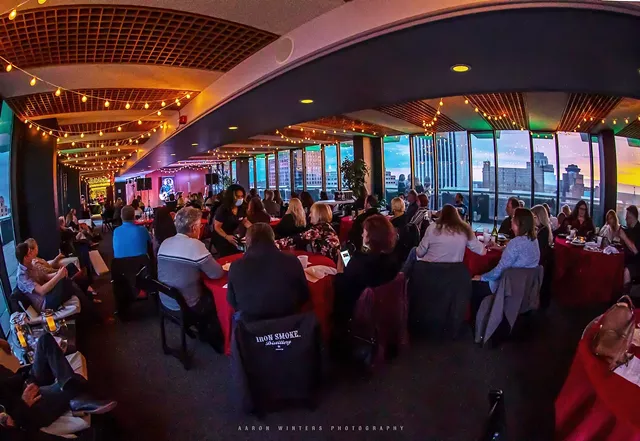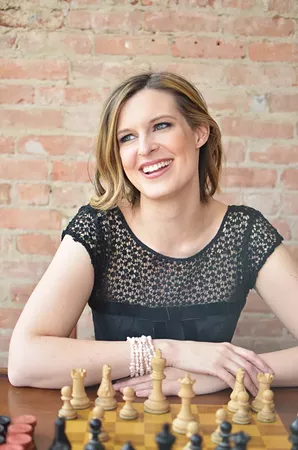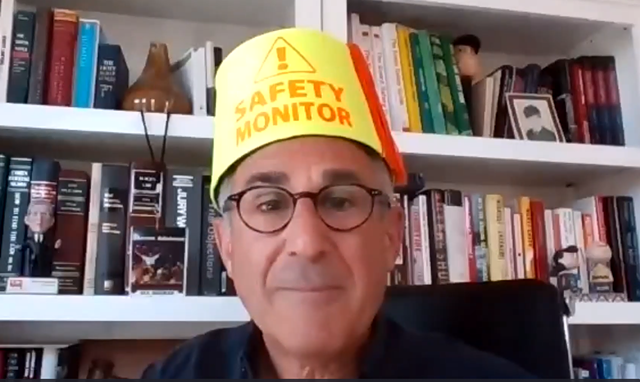
- PHOTO BY AARON WINTERS
- Tommy Brunett plays to an intimate crowd at The Penthouse at One East Avenue.
My first indoor concert in more than a year. Two solo acoustic performers: a ridiculously talented young guy, Max Doud, then Tommy Brunett, scratchy-voiced scenester and Fairport whiskey baron. It was a night at The Penthouse at One East Avenue, 11 floors up in the downtown Rochester skyline. It’s a spacious room, and the tables seemed separated enough. All four of the people at our table were fully vaccinated.
But what about everyone else in the fairly crowded room? Were they vaccinated? Were they a threat? I was a little edgy, asking myself, Am I doing the right thing?
When debating the question of when our arts scene will “return to normal,” as the optimists like to say, one thing’s for certain: Nothing’s for certain.
Last week, I also sat through a webinar called “Event Planning for Performing Arts Organizations and Venues.” The title was reassuring, yet the speakers seemed to generate as many questions as answers. Like, when will we see any live music events bigger than a band playing a local bar? Will state guidelines on capacities for large venues and festivals be expanded to the point that those events are economically feasible?

- PHOTO BY MATT DETURCK
- Rochester Fringe Festival Producer and Executive Director Erica Fee.
And there will be modifications. Last year’s Rochester Fringe was an all-virtual presentation; this fall’s performances will be a hybrid of virtual and in-person attendance. There will be no Spiegeltent, the quaint, mirror-filled Victorian theater usually parked at the intersection of Gibbs and East Main streets. And there will be no Parcel 5 extravaganza, attended by 10,000 people. The former is too intimate, the latter too likely a super-spreader event.
Hillary Olson, president and CEO of the Rochester Museum & Science Center, said that, like most museums, it is open with a caveat. “We’re not ready to come all the way back,” she said. But by mid-June, “when kids are on break and we have more audience,” RMSC expects to be ready, open seven days a week.
Erez Ziv is managing artistic director of FRIGID New York. The organization runs two New York City theater spaces that host five resident companies, generally offering 1,000 performances each year, two dozen shows each month, and eight festivals. When FRIGID was looking to put the live-entertainment freezeout behind it, Ziv was told that “guidelines are forthcoming.”
“That’s all the guidelines we had when we decided to do a show,” he said.
So in early April, Ziv said he presented New York City’s only publicly ticketed theatrical performance with a live audience and a live performer in more than a year. And he didn’t hold back. Monologist Mike Daisey delivered an excoriating solo show attacking the alleged bullying tactics of Gov. Andrew Cuomo and the hugely influential film and theater producer Scott Rudin.
Under Ziv’s guidelines, audience members had to be vaccinated. Ziv also sold nearly 600 livestream views. That virtual link went up a half-hour before the start of the performance so that viewers could enjoy that pre-show murmur that always accompanies any sold-out live theater performance; for this venue’s capacity limitations, that was the murmur of 22 people.
The response of the arts to the pandemic has been open to individual interpretation, and that’s not the fault of the arts. It’s business. Some bars and small venues have been presenting music — something “incidental” to go along with your dinner — for months now. It’s economic survival.
Festivals and large venues can’t turn on a dime. Orlando Ortiz is president of the Puerto Rican Festival, which celebrated its 50th anniversary in 2019, then took a COVID-19 break last year. “We’re in a holding pattern until we get more guidance from the state,” he said of this year’s festival.
Several of the webinar speakers encouraged the use of the Excelsior Pass, a New York state initiative. It’s an optional verification that you’ve been vaccinated against COVID-19, good for anything from wedding receptions to concerts to sports events. A Centers for Disease Control vaccination card can be forged, but the information on an Excelsior Pass is tightly regulated.
The public hesitancy is the fear that personal information can be stolen from the card. But Luke Charde of the state’s Office of Information Technology Service pointed out that the card contains no private information, save for: Yes, this person has been vaccinated against COVID-19.
As one speaker pointed out, “This means we won’t kill people.”
If there’s any through-line here, it’s uncertainty. Or, as another speaker admitted, “It’s all a guessing game.”
Steve Adelman was what you might call the webcast’s keynote speaker. Looks and sounds a bit like the actor Steve Carell. “Why should I listen to this guy?” he said, seemingly questioning his own credentials, as well as his coffee intake. “He seems rather caffeinated.”
But Adelman has credentials in this discussion. He is an Arizona sports and entertainment lawyer and a law school professor, focusing on risk and safety at live events. He was called upon to examine the 2017 Route 91 Harvest Festival shooting in Las Vegas, in which a hotel-room sniper killed 60 people and injured hundreds more at a Jason Aldean concert.
Adelman is a serious pro, who gently mocked the approach of Arizona Governor and “ice-cream scooper” Doug Ducey. Ducey is the former CEO of Cold Stone Creamery, if you’re wondering about the background of the people making life-or-death decisions. “If you would listen to our governor,” Adelman said, “the pandemic is over.”

- ZOOM SCREENSHOT
- Steve Adelman at the webinar “Event Planning for Performing Arts Organizations and Venues.”
Protecting ourselves from hazards can be an inconvenience, Adelman admitted. At one point during his talk, he put on a bright yellow fez labeled “Safety monitor” to emphasize — or more likely mock — his own role in warning the public of the danger presented by COVID-19. When the mask comes off, whether for singing or for eating and drinking, the opportunity for transmitting the virus increases, he noted.
“I don’t eat in public places these days," Adelman said, “because, well, I’m surrounded by knuckleheads.”
Jeff Spevak is WXXI's arts and life editor and reporter. He can be reached at jspevak@wxxi.org.
"make" - Google News
April 28, 2021 at 04:02PM
https://ift.tt/3nsw3sE
New York arts organizers make best-laid plans for live events - Rochester City Newspaper
"make" - Google News
https://ift.tt/2WG7dIG
https://ift.tt/2z10xgv
Bagikan Berita Ini














0 Response to "New York arts organizers make best-laid plans for live events - Rochester City Newspaper"
Post a Comment